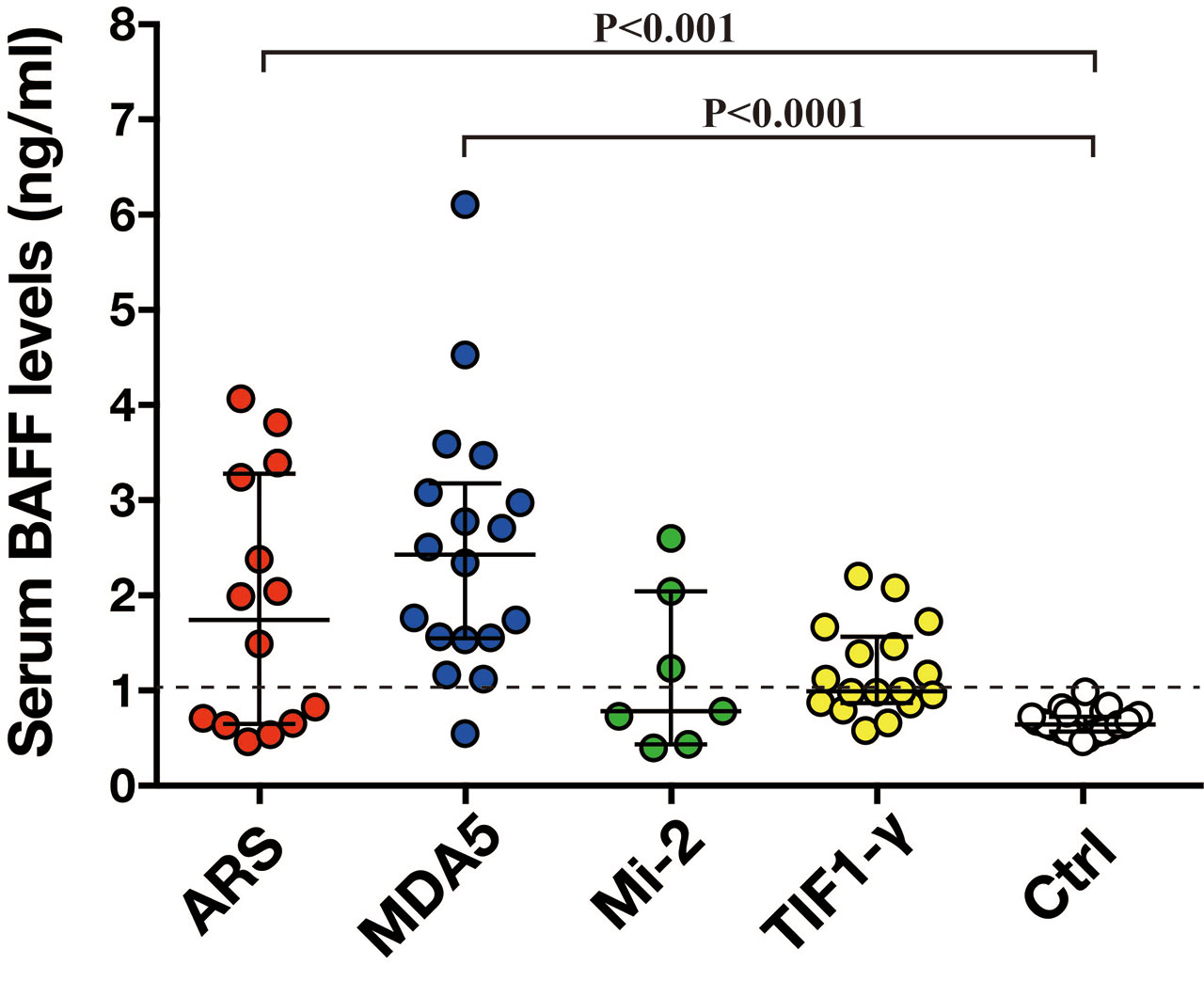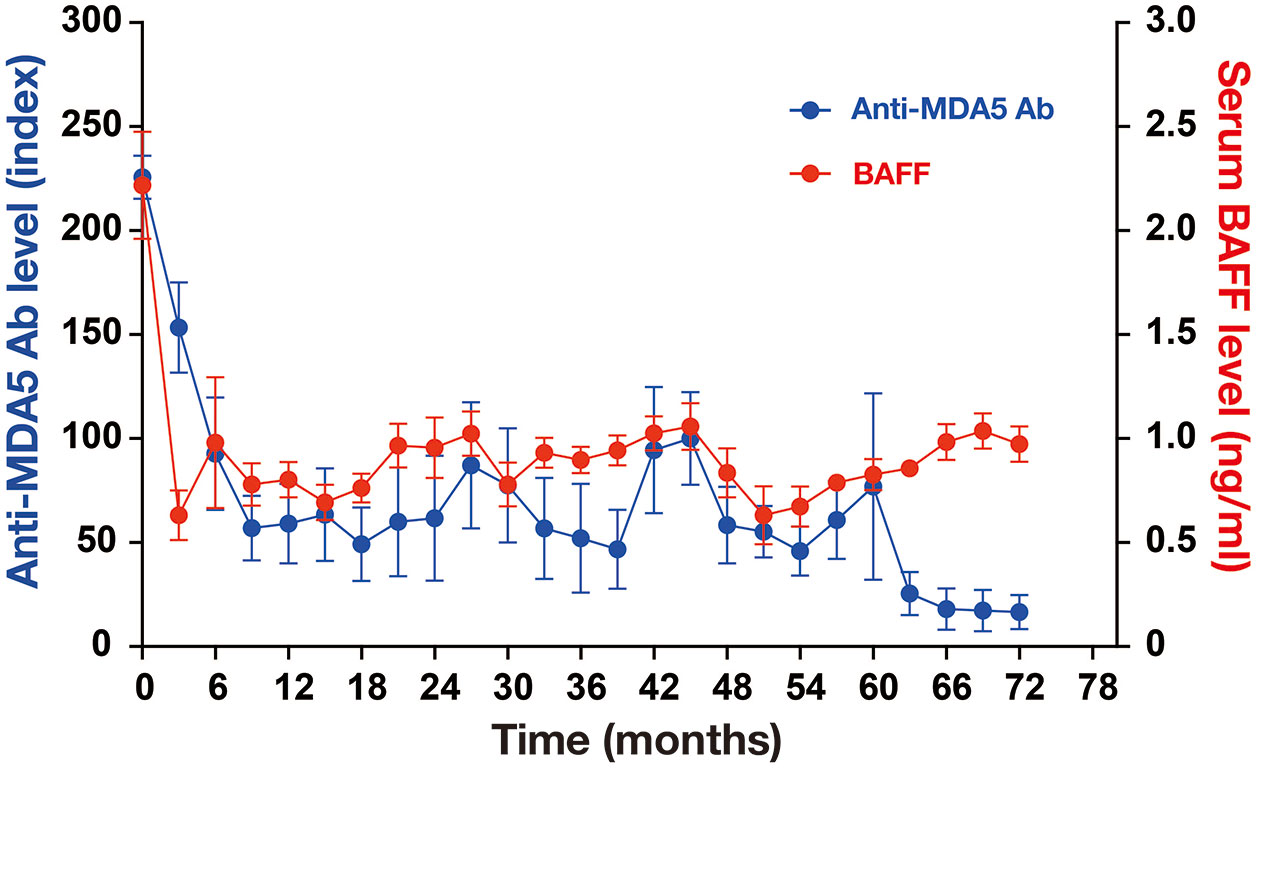Session Information
Session Type: Poster Session (Sunday)
Session Time: 9:00AM-11:00AM
Background/Purpose: Patients with dermatomyositis (DM) frequently have myositis-specific autoantibodies (MSAs), which are closely associated with different clinical features. Patients with anti-aminoacyl-tRNA synthetase (ARS) antibody (Ab) and anti-melanoma differentiation-associated gene-5 (MDA5) Ab often have interstitial lung disease (ILD); however, anti-MDA5 positive ILD is rapidly progressive and a life-threatening disease. Recently, anti-MDA5 Ab levels have been shown to correlate with disease activity in DM patients.Thus, B cells that are stimulated by excess B-cell activating factor (BAFF) play an important role in the pathogenesis of DM through autoAb production. In this study, we investigatedthe role of BAFF in DM patients.
Methods: We measured the serum BAFF levels in 56 adult DM patients (14 patients with anti-ARS Ab, 18 with anti-MDA5 Ab, 7 with anti-Mi-2 Ab, and 17 with anti-TIF1-γ Ab)using ELISA. For a longitudinal study, 130 serum specimens from 10 DM patients with anti-MDA5 Ab were analyzed.
Results: Serum BAFF levels were significantly higher in DM patients [median (range); 1.51 (0.39 − 6.11) ng/mL] than in healthy controls [0.65 (0.46 − 0.99)]. DM patients with elevated serum BAFF levels more frequently had ILD. In subgroup analysis, DM patients with anti-ARS Ab [1.74 (0.47 − 4.08)] and DM patients with anti-MDA5 Ab [2.42 (0.55 − 6.11)] exhibited increased BAFF levels compared to those in healthy controls, while DM patients with other MSAs showed BAFF levels comparable to those of healthy controls (Figure 1). In the longitudinal study, serum BAFF levels in DM patients with anti-MDA5 Abwere decreased after immunosuppressive therapy along with anti-MDA5 Ab level, which is a biomarker of the disease activity (Figure 2).
Conclusion: These results suggest that BAFF plays an important role in the pathogenesis of ILD in DM patients with anti-ARS and anti-MDA5 Abs.Furthermore, serum BAFF level is associated with disease activity in DM patients with anti-MDA5 Ab.
To cite this abstract in AMA style:
Matsushita T, Kobayashi T, Kano M, Hamaguchi Y, Takehara K. Elevated Serum BAFF Levels in Patients with Dermatomyositis: Association with Interstitial Lung Disease [abstract]. Arthritis Rheumatol. 2019; 71 (suppl 10). https://acrabstracts.org/abstract/elevated-serum-baff-levels-in-patients-with-dermatomyositis-association-with-interstitial-lung-disease/. Accessed .« Back to 2019 ACR/ARP Annual Meeting
ACR Meeting Abstracts - https://acrabstracts.org/abstract/elevated-serum-baff-levels-in-patients-with-dermatomyositis-association-with-interstitial-lung-disease/


